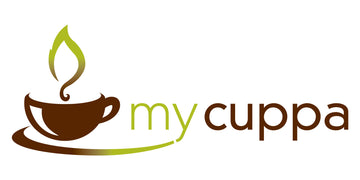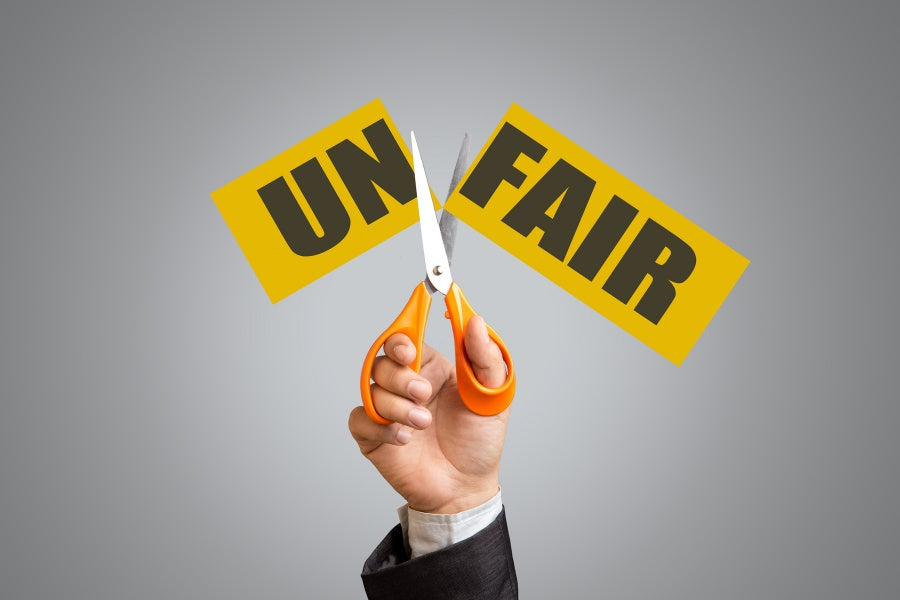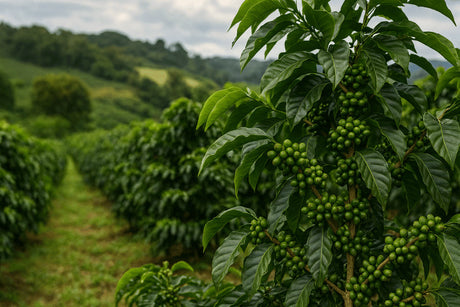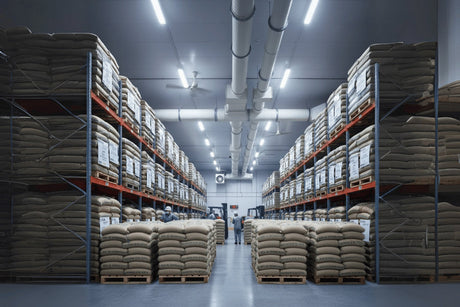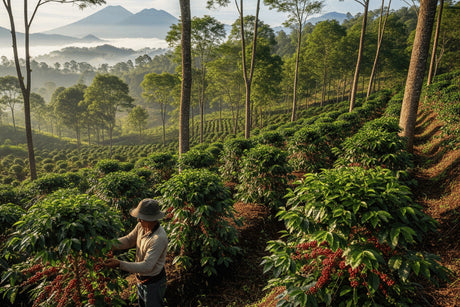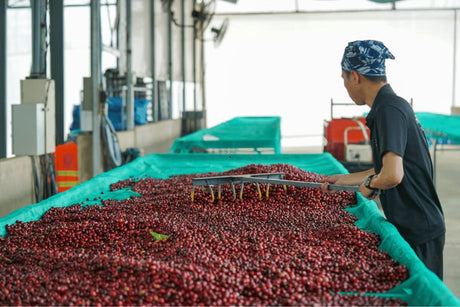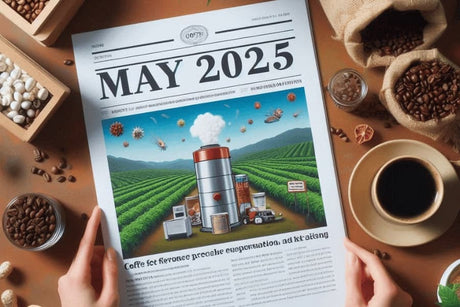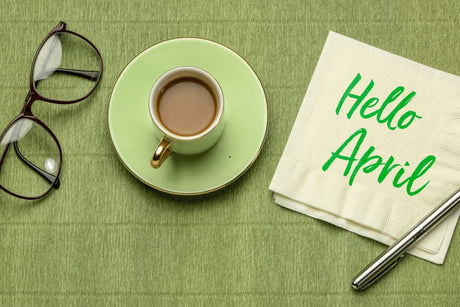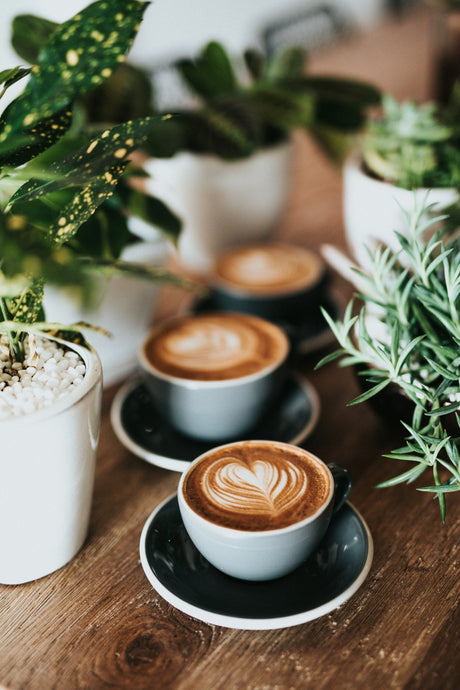“Education is the art of making man ethical.” — Georg Wilhelm Freidrich Hegel
mycuppa September 2019 Newsletter
It's hard to escape the plight of coffee farmers around the globe - they have certainly been doing it incredibly tough.
This month, we offer a certified FAIRTRADE Organic coffee as our Secret Label to encourage customers to switch to ethical sourcing to support coffee farming communities.
As a first, we have also revealed the coffees used in preparing this Secret Label blend - Colombia, PNG and Mexico. It's a lovely result with notes of red cherries, plum, caramel, toffee and dark chocolate.
This month's opinion piece looks at the rise of activism in coffee product packaging - Playing the Shame Game.

Our September 2019 Secret Label is now available for a limited time in 1kg packs.
This month, we want to support the global coffee farming community by offering coffees from the only certification program in the coffee industry that's honest, genuine and controlled adequately across the entire flow of goods from farmer to exporter to importer onto the roaster and the end-consumer - the FAIRTRADE system.
I have previously discussed the issues with specific certification programs in the coffee industry. These programs are often poorly managed, make empty claims, or are merely used by large corporations and companies to avoid being accused of unethical sourcing. It's unnecessary to delve further into how terrible the situation is.
For this month's Secret Label, we are going to try something different - for the first, it's not going to be a secret - we have not offered these coffees combined as a blend in the past, so it's fair to say that it is indeed new and unique.
We have taken three(3) of our popular certified FAIRTRADE Organic coffees and created a delicious product to encourage our customers to switch to ethical sourcing in support of FAIRTRADE.
Not only are these coffees also certified Organic, but we have also paid the FAIRTRADE premium that ensures farmers receive a higher price for their crop, directly helping secure a more sustainable future for these farming communities.
Colombia, PNG and Mexico produce stunning coffees in their own right. There, we have done it, revealing the Secret for this month. These lots are certified Fairtrade and Organic, producing a rich, sweet, balanced blend.
Individually, we had these coffees well sorted and gauged. However, during the blending process, we developed interesting characteristics not part of each standalone coffee - aromas of fresh strawberries, pleasant tasting notes of red cherries and dark chocolate with delicious salted caramel and toffee flavours in the finish.
One of the things we love about working with Organic coffees is the unpredictable results - you can uncover surprise packages whereby not every cup is the same as the last. Due to the organic process, the coffee is not as consistent as traditional coffee - that's the exciting X-factor in Organic coffee, where it can soar to incredible heights with pockets of unique fruits.
Buy as much as you want - we will roast it daily until the lot runs out.
Please note some of our Secret Label offers have often been sold out within two(2) weeks despite upping the allocation, so there is no guarantee the offer will remain open for the entire month.
For a limited time only - ending when the allotment has run out, which may occur before the end of the month.

We get more than a fair share of crazy emails in our inbox daily.
Yes, we are busy just like everyone else, but I feel compelled to speak out about something that's becoming just a bit annoying - the "single-serve packaging waste" shame game.
I'm still determining the rest of the nation, but in Melbourne, we are shockingly deep into a severe recycling crisis that has been plaguing us for a long time whilst councils and governments have been asleep at the wheel.
Of course, it would always end in tears when councils continued outsourcing their rubbish collection services to the cheapest rogue cowboy operators, banking their perversely expensive rate payments and disregarding the longer-term consequences.
Some of its toxic waste remains dangerously hidden in warehouses across Melbourne and buried in rural properties, contaminating the soil and water arterial s. In the immortal words of Donald Rumsfeld, in response to a lack of evidence for Iraq's alleged weapons of mass destruction - we have "unknown unknowns"......when it comes to hidden toxic waste.
Let's talk about the strange world of the internet and the people who inhabit it. At times, we receive messages from activists who demand that we stop packaging our capsules and pods in appropriate packaging and instead offer these single-serve coffee products without any suitable barrier protection.
They claim that we are harming the planet. Ironically, it's not the manufacturers of these plastic pod machines who are fueling the apparent demand.
Sure, we get it: save the planet, eliminate all metalized foils and unnecessary packaging. Still, the reality is that when you are dealing with fresh roasted coffee, there are active compounds that "leach" through almost every type of plastic or bio packaging (from a process called effusion), rendering the product stale, lifeless and "dead".
Suppose you can imagine being in our shoes for a moment. We receive these emails asking us to remove all the wrapping and protection on pods and capsules and to ship the product "naked" to the customer......
Hmmm, sounds great in theory, but who will take all the risks of the product being judged "inferior" or even "defective"?
So, in our most earnest way, we explain that coffee is remarkably different from almost every other food ingredient. All these complex active compounds require a metalized foil barrier to protect and preserve their freshness.
With this protection, the product becomes useful. We cannot remove this barrier, as doing so would likely result in disputes, complaints, and refund requests.
Often, individuals who are overly passionate about their beliefs may disregard even the most sensible and logical explanations. Despite the continued deceptive marketing that attempts to convince consumers that bio packaging is adequate, it still needs to be more reliable.
Advanced European labs have proven that microscopic holes in bio packaging do not provide a sufficient freshness barrier for coffee.
This debate will rage on for a long while until independent agencies endorse a scientific breakthrough with rigorous testing. Companies are trying to exploit a point of difference in the market by fooling consumers with their "packaging" claims. It's nothing but a promise, and we all know that promises are not a surety.
When attempting to explain to the person asking for this change, it would be easier for them to ditch their plastic pod or capsule machine because it's the primary driver of all this excessive packaging, and suggest instead they should move to a bulk coffee beans system, it inevitably ends up going around in circles with the same line of blaming us for "destroying the planet".
It's hard to argue the sensible logic of reducing the demand side by eliminating pod and capsule devices, but that's not going to happen any day soon; owning and using a pod or capsule appliance is directly supporting the growth of the single-serve portion control market and the associated accumulation of excess packaging that attaches itself to this ultra-convenience.
We don't use aluminium capsules because the environmental impact of creating the aluminium is 3 to 4 times greater than the alternatives - a fact that is often carefully obscured by the largest provider in the market.
Recycling programs for aluminium coffee capsules might appear on the surface as a great initiative, and depositing the empty capsules at a facility (e.g. florists) is a "feel good" gesture.
Recycling may seem like a great solution to reduce waste and preserve the environment, but it poses a significant challenge. Recycling requires tremendous energy to collect, sort, clean, and convert the recycled materials into reusable products, creating a robust energy deficit.
It's alarming to note that statistics on recycling adoption are rarely published, and some sources estimate the adoption rate to be below 18%. This lack of transparency concerning recycling rates may be intentional, and multinational corporations with a vested interest in the industry may be spinning positive PR to obscure the score.
We are consistently monitoring and researching new ways to reduce our environmental impact and keeping up to date with the latest advances in packaging.
Wherever possible, we adopt new materials for our products only when we are confident that they won't affect their quality and are well-received by our customers.
Consumers must understand that selling products, particularly coffee, is highly competitive.
We cannot afford to compromise on quality or drop our standards. Consumer expectations are at an all-time high, and the product must perform well; otherwise, it will fail in the market.
We are acutely aware of a growing activism in recyclable packaging. You only need to look at the latest trends in retail shopfront fit-outs (Country Road recently built a new store from recycled materials).
Like all businesses, we impact the environment and must continue to invest in initiatives to reduce our effect.
For many years, our facility has operated with high-capacity PV arrays. We invested significant capital in implementing sophisticated heat re-circulation systems on our primary roasting plant, and we have also installed the most energy-efficient thermal oxidizers for treating the emissions from coffee roasting.
Ironically, we do everything right. Yet, somehow, we get pinned as a target instead of the many, if not most, smaller coffee companies that don't use the correct systems to treat emissions because it adds considerable costs and complexity to their operations; they get away scot-free by continuing to release smoke and contaminants into the air.
We also take a holistic approach to the waste materials from roasting coffee beans - chaff and hessian bags - carefully diverted into mulch and reused for farming - nothing wasted.
